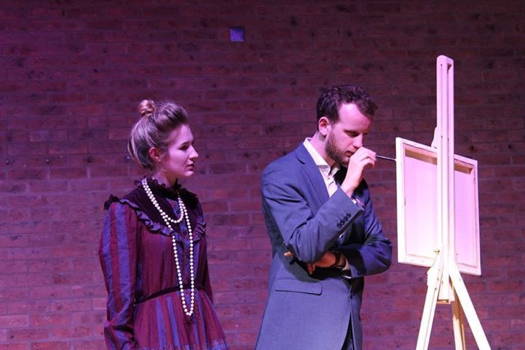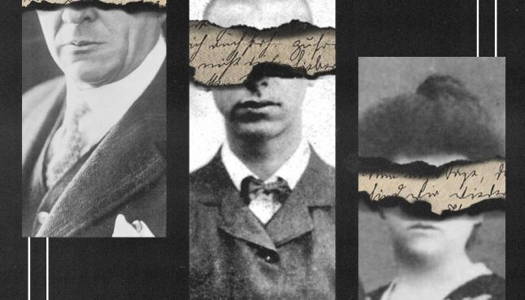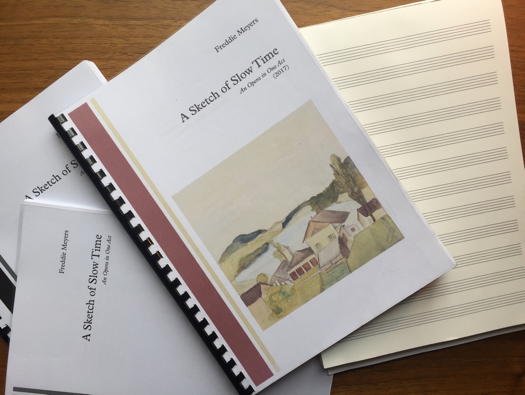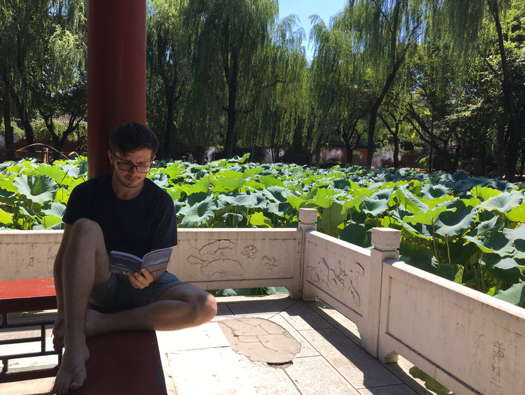|

A Great Start
Freddie Meyers' new opera 'A Sketch of Slow Time'
impresses ALICE McVEIGH
Freddie Meyers' brand-new opera [performed 2 and 3 November 2017 at the Jacqueline du Pré Building, Oxford University, UK] is based around the fascinating history of Arnold Schoenberg's marital crisis: the affair between his close friend, Richard Gerstl (an artist) and Mathilde Schoenberg, beginning with the affair's inception, and ending with the aftermath of Gerstl's suicide. The libretto was apparently either inspired by, or else directly lifted from, extant letters between the principals — at the end, to shocking dramatic effect. In the programme, Meyers scripted a short and cogent essay about his method of extrapolating from available sources, while acknowledging the fact that the Schoenbergs would have been furious at him, having been desperate to keep the scandal under wraps during their lifetimes.
Although the Jacqueline du Pré hall is not huge, its acoustic is so glowy that Steven Isserlis and other musical luminaries regularly perform there. The chamber orchestra was set up in the balcony — with the exception of the pianist, perched on the edge of the stage behind a grand piano. This should have occasioned issues with blending — or, at very least — of ensemble, but Meyers' conducting was so decisive, and his pianist David Palmer so alert, that the separation worked.
The set was rather basic, as were the costumes — Gerstl seemed to have wandered in from a muso's gig, while Schoenberg was garbed as a City exec — but the ladies had both made efforts at historical authenticity and, from the beginning, a lively, and 90% full, house was reduced to rapt attention, by Director Cassie White's notion of having Isabella Pitman's soprano singing, unseen, from the left balcony. Pitman, tall, fair and languorously beautiful, proved an inspired choice for Mathilde, as her sinewy instrument is already capable of pitch-perfect roulades as well as exquisite control. At times, she also acted very well — she should have smouldered rather more, but I sense that the smouldering will come. (There was one moment — her silvery soprano glissandoing skywards, when she took my breath away.)

Isabella Pitman as Mathilde Schoenberg and Tom Lowen as Arnold Schoenberg in Freddie Meyers' new opera 'A Sketch of Slow Time'. Click on the image for higher resolution
|
As Schoenberg, Tom Lowen had far fewer shots at smouldering: his was the most passive third of the love triangle, and, despite a rich bass voice, he appeared so rigid, taciturn and brooding in character as to tug one's sympathies towards the guilty pair. Still, his chilliness at the conclusion was gripping, while throughout there was that poised, deep sound, so intelligently employed!
He was well-matched in the big, bold and bountifully gifted Maximilian Lawrie (Gerstl). Another singer certain of future success, Gerstl scooped the acting prize (at least on the night I attended). His tenor is as notable for its variety of tone colour as for its luminous quality. Tom Dixon, meanwhile, is utterly wasted studying Biochemistry, as he boasts a clean, commanding counter-tenor, along with real comic presence. Miriam Chapman-Rosenfeld dug every possible bit of meat out of her minor role, in the acting as well as the singing department.

Flyer for Freddie Meyers' opera 'A Sketch of Slow Time'. Click on the image for higher resolution
|
It was hard to believe that the vast majority of performers were undergraduates, so polished was the performance as well as the opera: the composer/conductor is apparently only twenty-one. He must have conjured every possible combination, in terms of feeling, timbre and dynamics, from single strings, clarinets, horn, percussion and piano, controlling his forces brilliantly, while giving his singers every chance to breathe, project and shine. His music varied constantly, from delicate to serious to seriously astringent. There were moments of raw power — Gerstl's last scene and his seduction of Mathilde — and some sections of emotional bleakness (the last scene, between the Schoenbergs). Quarter tones and special effects were used astutely, amidst moments of arresting beauty. Will Medcalf's percussion alternately bristled and shimmered; the athletic Myrddin Rees Davies might have been nailing a horn concerto at various points; while Richard English seized eagerly upon his double bass cadenza (the omission of a cello — to my astonishment — really worked, adding sharp astringency to the tonal palette as well as interest in the bass department). There was not a weak link: either in the orchestra or in the cast.

The full score for Freddie Meyers' opera 'A Sketch of Slow Time'. Click on the image for higher resolution
|
So, what could have been improved? The singers' diction was generally excellent, but surtitles would have been wonderful — but the JDP is after all a concert hall, and not an opera house. I suspect that the first scene could have been shortened, and that Arnold Schoenberg should have had a bigger scene, all to himself, later in the work. (I learned, from the programme, that the lovers had been caught in flagrante in real life — what a chance missed!) But despite this, Meyers is a phenomenal talent; he has composed a wonderful work; and the audience reception must have felt overwhelming.

Freddie Meyers (born 1996, BBC Inspire Composer 2002). Click on the image for higher resolution
|
What a great idea; what a great night [reviewed 3 November 2017]; and what a great start! — and not just for Freddie Meyers.
Copyright © 6 November 2017
Alice McVeigh,
Kent UK

|

